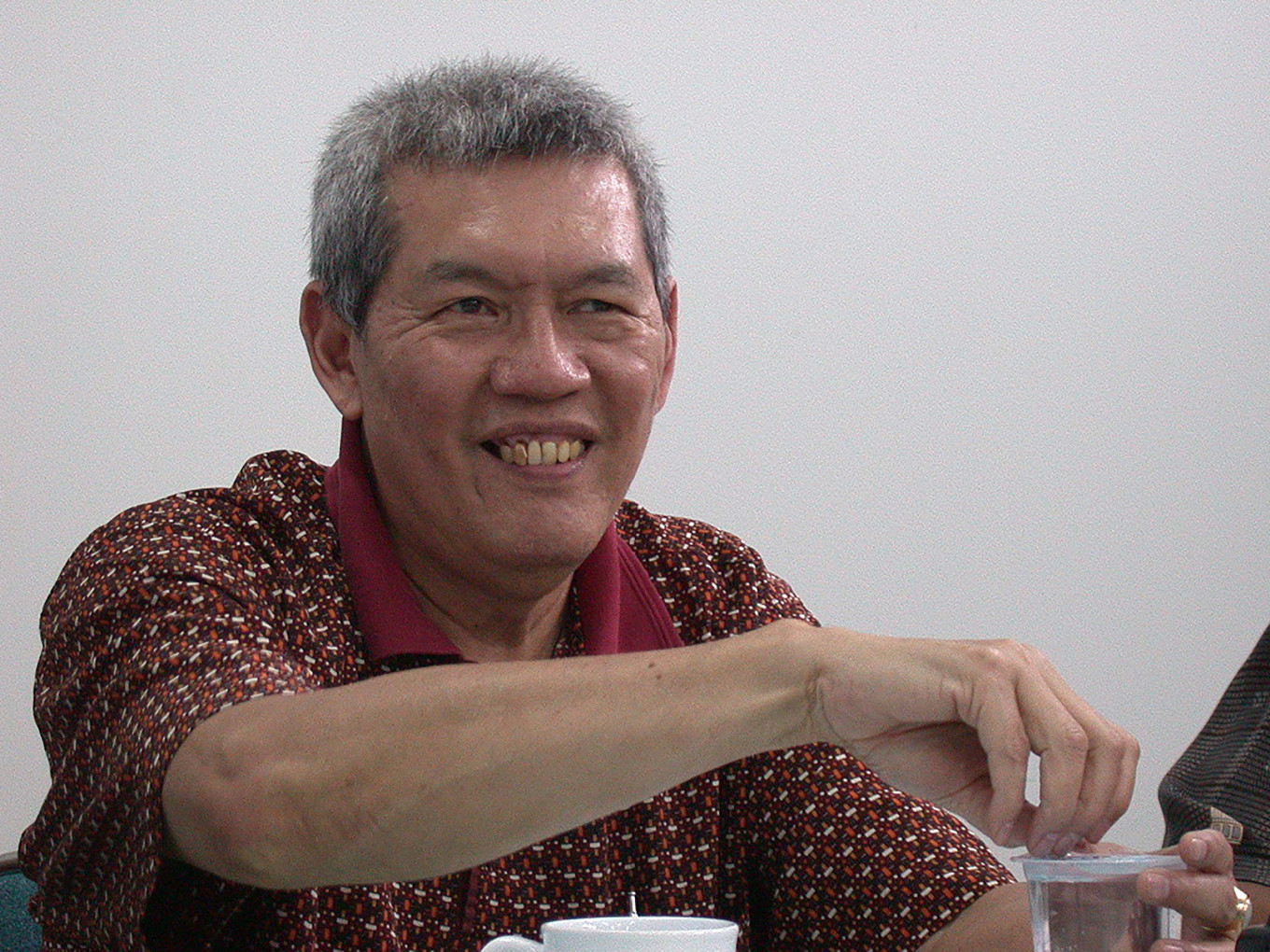Popular Reads
Top Results
Can't find what you're looking for?
View all search resultsPopular Reads
Top Results
Can't find what you're looking for?
View all search resultsArief Budiman, dissident academic under New Order, dies at 79
Arief, born Soe Hok Djin to a poor Chinese family in West Jakarta on Jan. 3, 1941, passed away after a battle with Parkinson’s disease.
Change text size
Gift Premium Articles
to Anyone
A
rief Budiman, a public intellectual who introduced leftist ideas to students and activists in the early 1990s and a leading opposition figure against the New Order regime, died on Thursday. He was 79 years old.
Arief, born Soe Hok Djin to a poor Chinese family in West Jakarta on Jan. 3, 1941, passed away at Ken Saras Hospital in Salatiga, Central Java, after a battle with Parkinson’s disease. He was survived by his wife Leila Ch. Budiman, his son and daughter and several grandchildren.
Arief's colleagues and friends shared the news of his passing on social media. Human rights activist Andreas Harsono was among the first to deliver the news on Twitter.
"Arief Budiman or Soe Hok Djin […] passed an hour ago in a hospital near Salatiga, Central Java, from Parkinson’s," Andreas wrote in a tweet on Thursday afternoon.
Later, in a statement sent to The Jakarta Post, Andreas said the sociology professor had planted the seeds of resistance against the oppression of the New Order regime by introducing radical ideas to students, first at the Satya Wacana Christian University (UKSW) and later through his book Teori Pembangunan Dunia Ketiga (Development Theory of The Third World).
"I joined his discussion group. Nothing was formal but he gave us a lot to read, from Karl Marx to The New Yorker magazine – as well as samizdat like Inside Indonesia [Melbourne] and Tapol [London]," Andreas said.
Arief also practiced what he promoted in his classes and books by joining protests against the New Order’s oppressive policies.
"In 1989, when the Soeharto regime began to inundate hundreds of villages in Boyolali for the construction of a dam, Arief got involved, not only through his writing and protests against the World Bank, but also by helping organize student protests," Andreas said.
Arief, who was the older brother of legendary student protester Soe Hok Gie, often scathingly criticized General Soeharto, who became the president of Indonesia soon after a 1965 coup that was blamed on the Indonesian Communist Party (PKI). Soeharto was deposed in 1998.
"Soeharto is corrupt. He killed a lot of people, just like Pinochet. He built an unstable political system. But he did more. He ran a school that produced politicians, including opposition politicians, who cannot change the system," Arief wrote in Tempo in January 1999.
UKSW rector Niel Samuel Rupidara said the university had lost its most "precious asset". One of Arief's legacies at UKSW was the creation of a postgraduate program in development studies.
Niel added that Indonesia had lost one of its brightest intellectuals and that Arief had made an essential contribution.
Arief's former colleague at the University of Melbourne Asia Institute, director and professor of Asian studies Vedi R. Hadiz, said Arief was a man of a great integrity and courage – two qualities that got him into trouble with the authoritarian New Order regime.
"He was a scholar-activist in a true sense and a mentor to many subsequent scholars of Indonesian society, including me," Vedi said in a statement made available to the Post on Thursday. "I had the great pleasure of knowing him well. I am also glad that I managed to visit him on at least a couple of occasions during his recent long period of illness," Vedi added.
Arief, who got his PhD in sociology at Harvard University in 1980, joined the University of Melbourne’s faculty in 1997 and was appointed chair of the Indonesian program.
Born into a Chinese family, Arief was determined from an early age to defy the stereotype of ethnic exclusivity and proudly considered himself an Indonesian.
In 1970, against the wishes of his American author-academic friend Benedict Anderson, Arief decided to change his name and asked his Minang wife Leila to pick a suitable one for him.
Anderson told Arief and Leila that names were sacred and that changing them would be tantamount to disrespect.
Despite his lengthy stay in Australia, Arief continued to have an emotional connection with Indonesia, and in an interview with the Post in 2008, he said that he was very Indonesian at heart.
"I enjoy life here. I follow Australian politics and find it interesting – in a cerebral sense. Political crises in Australia, for instance, somehow do not touch me too deeply. On the other hand, I live Indonesian politics. I'm there in a primordial sense. The ups and downs of Indonesian politics affect me emotionally," he said.
Mira Lesmana, the producer of the movie Gie, a biopic about Arief’s brother Soe Hok Gie, said she “respected Arief highly and adore his family”.
“We just lost a great human being. He was such an intelligent man, so honest, down to earth and no-nonsense.... May he rest in peace,” Mira told the Post.
Arief’s friend, scholar Daniel Dhakidae, the chief editor of social economics journal Prisma, said that “it is a tough job to describe Arief Budiman in a few words, as a man of many talents, with many sides to his personality.”
“This includes a series of paradoxes inherent in his personality as a human being, a man of literature, and as a scientist and sociologist actually,” Daniel wrote for the Post.
Daniel revealed Arief’s side as a film critic, highlighting the time when Arief wrote a piece for a national media outlet, defending a movie, in which the main actress is shown naked for several minutes, from censorship.
“The thing that struck me as a younger student at Gadjah Mada University in the 1970s was his view on Ganzheitstheorie [holistic theory] in which an art work should be seen against its entire background, social and political context etc. Equipped with this sort of view, he advocated for, or more precisely, he defended the film,” Daniel said.
“He fought against the film censor labeling it as pornographic. He made his case, saying it was a nice film seen against a classical Greek background, a Ganzheit argument. He won the case and we students enjoyed watching the film,” Daniel went on.
Arief was also part of the early feminist movement during the New Order era. Andreas said one of Arief’s classes was on gender discrimination. “[In the class], he talked about contraceptives, reproductive health and family planning, suggesting his male students should get a vasectomy like him. He introduced Simone de Beauvoir’s book The Second Sex, prompting me to read that thick book,” Andreas said.
Triningtyasasih, the head of Yayasan Rifka Annisa Sakina, a well-known Yogyakarta-based women's crisis center, said Arief and his wife Leila were involved in the establishment of Rifka Annisa. “He wrote a book on gender division in work in the 1990s. There was a discussion on the book in May 1990. Later, the Rifka Annisa founders frequently consulted him and Ibu Leila before the founding of Rifka Annisa,” she told the Post.
Ganug Nugroho Adi contributed to this story from Surakarta, Central Java











